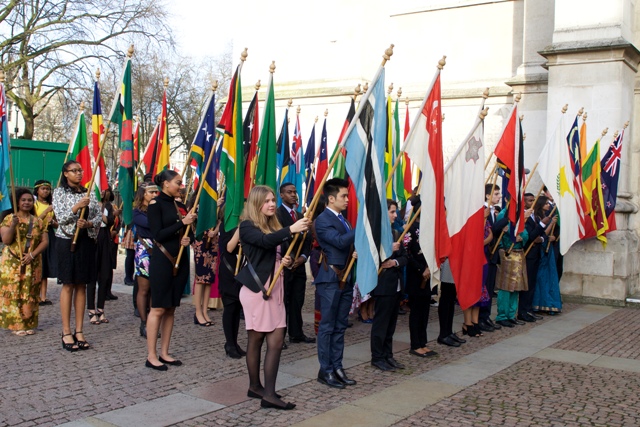By Debbie Ransome
Going beyond the basic storyline to dig deeper into the Haitian reality and how it gets reported, this

In the midst of the often high-profile royal events during Commonwealth Week, wise words from Barbados echoed from the past as the UK revisited ties between monarchy and the Commonwealth.
Commonwealth Week 2021 was unlike any other for two main reasons – one, the virtual nature of events caused by the coronavirus pandemic and, secondly, THE Oprah Winfrey interview with Prince Harry and his wife Meghan, broadcast on 7 March - the eve of Commonwealth Day.
The allegations of racism, lack of support and estrangement made by the couple during the interview provided the world with an insider’s view of life within royal circles. The fact that the comments came from Prince Harry and his wife brought back memories of Harry’s mother, Princess Diana, publicly outlining her struggle with royal life in 1995.
As the fall-out from the CBS interview continued to rack up global column inches, a Commonwealth Day panel session held by the Institute of Commonwealth Studies in London looked at Empire into Commonwealth: The Past, Present and Future role of Britain’s royal family in a global context. Because two of the panellists are involved in an academic survey examining Caribbean ties to monarchy, the region came to be used during the session as an example of how recent events would affect royalty’s long-term appeal.
“Benign” monarchy
Dr Kate Quinn is the associate Professor in Caribbean History at the Institute of the Americas at University College London. She outlined how Jamaica and Barbados were raising the issue of moving to republicanism. She explained how republican sentiments had been raised in the #notmyprince social media thread during a Prince Harry visit to the Caribbean, years before his marriage to Meghan Markle.
Dr Quinn said there had been “minimal” mention of Commonwealth Day 2021 in the Caribbean press. She said that the majority of Caribbean newspaper articles about the Commonwealth tended to be syndicated news, stories on controversies surrounding Caribbean-born Commonwealth Secretary-General, Baroness Patricia Scotland, or mentions of Harry and Meghan.
Associate Professor of Early Modern Literature and Culture at the University of Southampton, Dr Alice Hunt, is also a part of the research team on the project ‘The Visible Crown: Elizabeth II and the Caribbean, 1952-present’. She spoke of the “benign” representation of monarchy which had allowed the blurring of the roles of UK monarch and Head of the Commonwealth. She said that it was not sustainable for the Head of the Commonwealth to be a hereditary role and that the appeal to “duty” for the Commonwealth, as described by the Queen, would be “increasingly problematic” in the future.
Dr Hunt said that symbols mattered. The Queen’s head on coins, UK symbols on flags and royal visits all helped to push “this royal touch”, creating “a kind of magic” which was difficult to account for. A number of the panellists said they did not think that this close link between monarchy and Commonwealth could endure beyond Queen Elizabeth’s reign.
During the Q&A session, Dr Quinn pointed out that the monarchy had served a role in the pre-independence Caribbean as a way to appeal above the heads of local governors. She said other Caribbean countries – Trinidad & Tobago, Guyana and Dominica – had moved to become republics without holding referendums, but Jamaica and Barbados were currently touting the idea of each holding a referendum on the route to becoming republics.
Dr Quinn said that Barbados Prime Minister Mia Mottley had quoted the island’s first Prime Minister, Errol Barrow, as advising Barbados against “loitering on colonial premises”. She said that the Commonwealth today also had to move with the “tides of history”, which included dealing with “royalty loitering on Commonwealth property”.
On Meghan Markle’s comments about life in royal circles, panellists said that allegations of racism in the UK would “not come as a shock” to Caribbean people. The comments would not, however, do the monarchy any favours in the Caribbean.
Royal ‘celebrities’
By the end of Commonwealth Week, the royal impasse made its way into the Caribbean papers.
Letters to the editor in the Jamaica Observer included comments such as:
Barbados Today columnist Ralph Jemmott wrote that the Oprah interview had convinced him more than ever that the Barbados plan to adopt republican status was the correct move. He added: “The notion that Barbados and its people should continue to swear allegiance to Her Majesty the Queen and her heirs in some form of perpetuity now seems highly ridiculous....As I have written before, the Queen still merits some respect but her heirs and successors are little more than celebrities.”
Barbados’s former High Commissioner to London, Guy Hewitt, wrote an 11 March commentary about his associations with royalty over the years in diplomatic and other circles. He said: “If the Crown and Head of the Commonwealth are to remain conjoined, the Royal Family must act with haste to embrace the 21st Century and get to understand and form authentic relationships with a critical amount of the billions of brown, black and tan faces across the Commonwealth. They must resist and cast out the demons of their colonial past.”
He concluded: “If they don’t want to risk losing not only the Commonwealth but their standing at home, they must act to rescue their tradition and position from becoming an anachronism. The ‘commoners’ deserve better and I anticipate will demand more going forward. Given my affinity with the Commonwealth, I pray that they succeed. Long live the Queen. Vive la République Barbados.”
Tweet
By Debbie Ransome
Going beyond the basic storyline to dig deeper into the Haitian reality and how it gets reported, this
[photo: Patti Smith & Winston Rodney, cred Ted Bafaloukos]
In a year of global challenges and fall-out, we at Caribbean Intelligence© have focused on the aspirational side of Caribbean life.